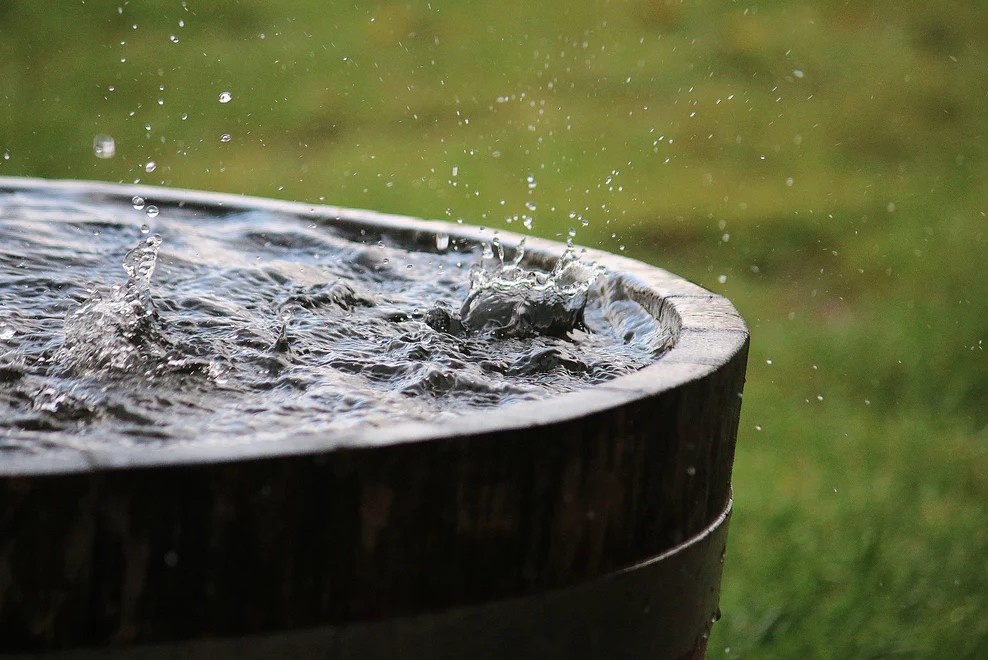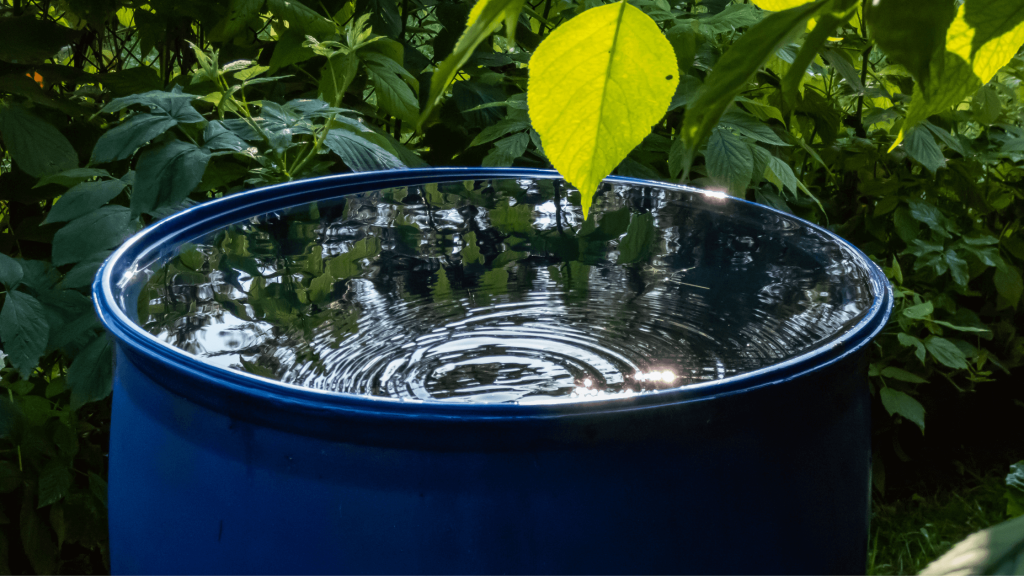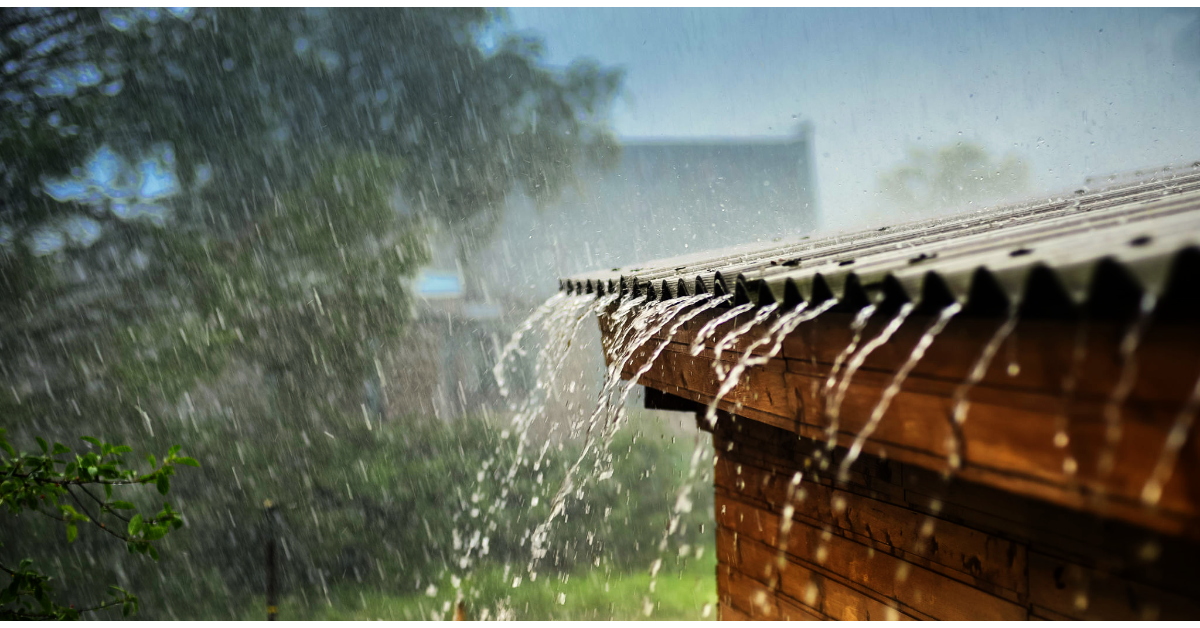The Classic City Rotary of Athens Eco Passport is a year-long initiative to encourage members to engage in eco-friendly activities and promote environmental awareness. Members earn points by completing various sustainable actions, such as recycling, composting, attending environmental talks, and participating in service projects. ECORotary@sosuin.org

Eco Passport Item # 26 – “If possible, harvest rain water to reduce reliance on municipal water source.”
By Salome Alvarez, Southern Sustainability Institute, Athens, GA
Email: Blog@sosuin.org
Looking for a way to save money, conserve resources, and support local water sustainability? Harvesting rainwater is a simple and eco-friendly method to reduce your reliance on the municipal water supply and help Athens in the fight against water scarcity. Rainwater harvesting is not only a practical solution for your home—it’s a powerful step toward creating a sustainable future for our community.
With an affordable rain barrel setup, you can capture rainfall and store it for use in your garden, plants, or even outdoor cleaning tasks. By making the most of Georgia’s rainy season, Athens residents can take advantage of an accessible water source and reduce pressure on the city’s water infrastructure.
A Brief History and Purpose of Rainwater Harvesting
Rainwater harvesting is an ancient practice used worldwide to conserve and store water. People have been collecting rainwater for thousands of years, from clay pots and cisterns in early civilizations to advanced irrigation systems in arid regions. As modern communities face increasing water challenges, this traditional method has gained renewed popularity as an effective way to support local water conservation.
In Athens, where rainfall varies throughout the year, capturing rainwater can be a practical way to supplement household water needs and ease demand on municipal resources. Rotary clubs in the area often promote sustainable practices like rainwater harvesting to empower residents to be more eco-conscious and self-sufficient.

Why Harvest Rainwater in Athens?
Rainwater harvesting is a valuable, low-cost practice that has both personal and community benefits. Here’s why you should consider harvesting rainwater:
- Reduce Your Water Bills: Using rainwater for non-drinking purposes, such as watering your garden or washing outdoor surfaces, can significantly lower your monthly water bills. Over time, the savings add up, especially during the peak watering season in spring and summer.
- Decrease Demand on Athens’ Water System: Athens-Clarke County’s water system serves thousands of residents and is vital to our community’s needs. By collecting rainwater, you’re helping reduce the strain on this shared resource, especially during times of drought or water restrictions.
- Promote Local Water Conservation: Georgia is no stranger to drought, and every effort to conserve water counts. By harvesting rainwater, you’re taking an active role in promoting water sustainability in Athens and ensuring that municipal water remains available for essential needs.
- Provide Natural, Chemical-Free Water for Your Plants: Rainwater is naturally softer than tap water and free from the chemicals added to municipal water supplies. Plants, especially garden vegetables and flowers, thrive with this untreated source, which better supports soil health and plant growth.
- Lower Your Environmental Impact: Rainwater harvesting reduces the need to pump and treat municipal water, which conserves energy and reduces emissions associated with water treatment. It’s a small yet impactful way to decrease your environmental footprint.
- Be Better Prepared for Dry Periods: Rain barrels or cisterns can provide an emergency supply of water during dry spells or restrictions. Having a backup water source can be useful, especially during Georgia’s hotter months when rain may be less frequent.

How to Start Harvesting Rainwater in Athens
Ready to set up a rainwater harvesting system at home? It’s easier than you might think, and the rewards are well worth the effort! Here’s how you can get started:
- Install a Rain Barrel: A rain barrel is one of the simplest ways to start harvesting rainwater. You can purchase one from a local garden center, home improvement store, or even through Rotary or community conservation programs. Athens often holds rain barrel workshops where you can learn to build or install your own.
- Connect Your Rain Barrel to a Downspout: Most rain barrels are designed to connect to a home’s downspout, capturing water from the roof during rainfall. Once installed, be sure to position the barrel on a stable surface to prevent tipping. For additional conservation, consider adding multiple barrels for extra capacity.
- Use Collected Rainwater for Non-Potable Purposes: The water collected in your rain barrel is great for outdoor uses like watering plants, gardens, and lawns, as well as washing outdoor equipment. While rainwater isn’t typically treated for drinking, it can cover many household needs where municipal water isn’t necessary.
- Regularly Clean and Maintain Your System: Check your rain barrel periodically to ensure that the screen, lid, and spout are clear of debris, and drain the barrel during extended dry spells to prevent stagnation. Proper maintenance keeps your rain barrel functioning efficiently and prevents issues like algae growth or mosquito breeding.
- Consider a Larger Cistern for More Extensive Harvesting: For those with larger properties or more significant water needs, installing a cistern can provide greater storage capacity. This is a more involved setup, but it can offer a substantial water supply for larger gardens or small farm needs.
- Explore Local Incentives and Resources: Rotary, the Athens-Clarke County government, and local environmental groups sometimes offer rain barrel workshops or discounts to encourage residents to get involved in water conservation. Keep an eye out for programs and resources that can help you set up a rainwater harvesting system affordably.

Rainwater Harvesting and Athens’ Environmental Goals
Athens is dedicated to creating a sustainable community, and water conservation is a crucial part of that effort. As demand on our water systems continues to grow, initiatives like rainwater harvesting can have a real impact on local sustainability. By reducing our reliance on municipal water, we help extend the life of Athens’ water resources and support a greener, more resilient community.
Through programs like Bring One for the Chipper, litter cleanups, and recycling drives, Rotary and Athens’ residents are already making strides in environmental protection. Rainwater harvesting is yet another way to contribute to a more sustainable Athens and build resilience against future water shortages.
Join the Rainwater Harvesting Movement in Athens
Rainwater harvesting is more than a personal choice—it’s a community-driven effort to conserve resources and make Athens a model of sustainable living. Rotary clubs in the area are committed to promoting practices like these and encouraging local residents to make small changes with big environmental payoffs.
When you harvest rainwater, you’re not just saving money and conserving resources—you’re part of a movement to protect our water and ensure that Athens remains a vibrant, environmentally conscious community for generations to come.
So, next time it rains, consider how that water could be put to good use around your home. With just a few simple steps, you can start harvesting rainwater and join the effort to make Athens a more sustainable, self-sufficient city.
Resources:
https://parachutekalpavriksha.org/blogs/blog-post/rooftop-revelations-harnessing-natures-bounty-with-rooftop-gardens
https://www.simplegreenenergy.org/rainwater-harvesting-a-sustainable-solution-for-water-conservation/
https://www.linkedin.com/pulse/rainwater-harvesting-sustainable-solution-water-management-hasan-2xluc/
